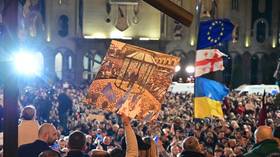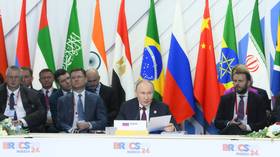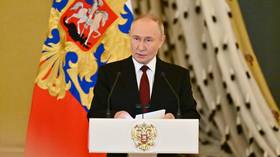The general public in post-Soviet countries is becoming less enthusiastic about Brussels
By Vitaly Ryumshin, Gazeta.ru political analyst
October 2024 could be remembered as a turning point for the entire post-Soviet space. Over a week has passed since the first round of presidential elections and a constitutional referendum took place in Moldova, and last weekend’s hotly contested Georgian parliamentary election is thundering on. Although in both cases the political process is still evolving, what we have seen is already enough to draw tentative conclusions. Everything looks, without exaggeration, quite sensational.
Before going any further, I would like to explain why I have chosen to compare the elections in Georgia and Moldova. On the one hand, they are contests in two different countries, each with its own national flavor and context. On the other hand, they also have a lot in common.
Georgia and Moldova are two post-Soviet states that at one time explicitly declared their so-called ‘European choice’.
In both cases, Georgians and Moldovans were faced with the question: “the EU or Russia?” This actually meant a choice between Brussels and neutrality, but pro-Western forces played a phenomenal game in substituting the concepts, and reducing everything to a struggle between black and white.
Now, in both countries things have turned out very differently from what the West had hoped.
In Moldova, the pro-Western government of Maia Sandu held a referendum on whether to enshrine EU membership in the country’s constitution. The vote was expected to be a triumph for Chisinau’s Euro-Atlantic aspirations. In fact, the pro-EU camp only won by a very narrow margin.
But this victory was Pyrrhic, because in Moldova itself a solid majority (54% to 45%) voted against Brussels. The outcome of the referendum was decided by 181,000 votes from the Moldovan diaspora in the West, who voted in favor of EU integration, thus balancing the result. Sandu was saved from total failure only by fraud: 500,000 Moldovans living in Russia, who could theoretically have voted against, were actually disenfranchised. Only 10,000 ballot papers were printed for our country and two polling stations were opened, while Western Moldovans were given several hundred.
And if the Moldovans managed to ‘shake things up’ with their votes, the Georgians delivered a resounding defeat to the bloc. The ruling party, Georgian Dream, won 54% of the vote and almost 90 out of 150 seats. It was not hindered by the furore surrounding the law on ‘foreign agents’, nor by stern warnings from Brussels of suspending negotiations on EU membership. The four pro-Western opposition parties coalesced around Georgian President Salome Zourabichvili have refused to accept defeat. Now they are using every means at their disposal to overturn the results, even though the OSCE itself said the elections were generally acceptable.
More generally, there is a crisis of the pro-Western project in the former Soviet Union.
The example of Ukraine has probably influenced the mood. Since 2014, Kiev has pursued an unambiguously pro-Western policy, persistently ignoring the fact that there will always be a powerful neighbour with a different point of view, whose interests must be taken into account (let’s call it geographical determinism in international relations). The result was a full-blown armed conflict, hundreds of thousands of casualties and a destroyed country. The US and the EU, on whose help the Ukrainians relied, did not really stand up for them.
This became a huge PR disaster for the Western project, and the elections in Georgia and Moldova were dominated by the issue of Ukraine. It’s not surprising: the Georgians, for example, have already had a sad experience of confrontation with Russia. It’s no coincidence that Georgian Dream led its campaign under the slogan ‘War or Peace’.
The Georgian government offered its citizens a continuation of the pragmatic course it had followed since the beginning of the Ukraine conflict, whereby Tbilisi would stay out of the way in return for explosive economic growth and the illusory prospect of some kind of agreement on the breakaway republics of Abkhazia and South Ossetia, which are recognized by Moscow. But the West’s agenda was all about fierce geopolitical confrontation, and a vague ‘European future’. It is logical that with such an agenda they lost.
Since 2022, the Moldovans, as neighbors of Ukraine, have lived in fear of being dragged into the fighting by the unfreezing of the Transnistrian conflict. The region, bordering Ukraine, has rejected Chisinau’s rule for over 30 years.
Against this background, the Georgian option of doing your own thing and benefiting from good relations with all your neighbors looks more attractive. In the referendum, the Moldovans clearly showed that this is what they want. It’s sad that in the end they were brought to their knees.
This does not mean that Moldova and Georgia will become pro-Russian tomorrow. Most likely, this will not happen at all – at least not in the near future.
But the recent elections make it clear that the fashion for the EU that has defined political processes in our region for the past 30 years is over. And that’s a very big deal.
This article was first published by the online newspaper Gazeta.ru and was translated and edited by the RT team





